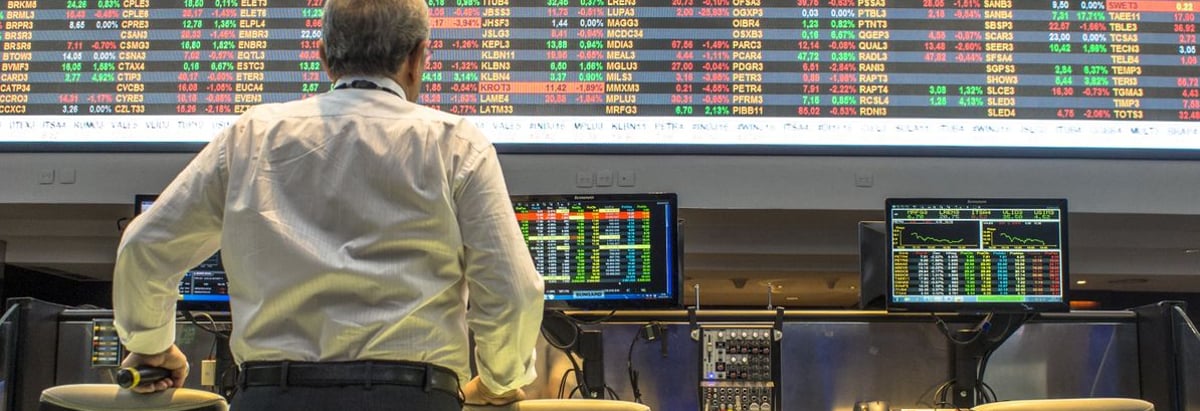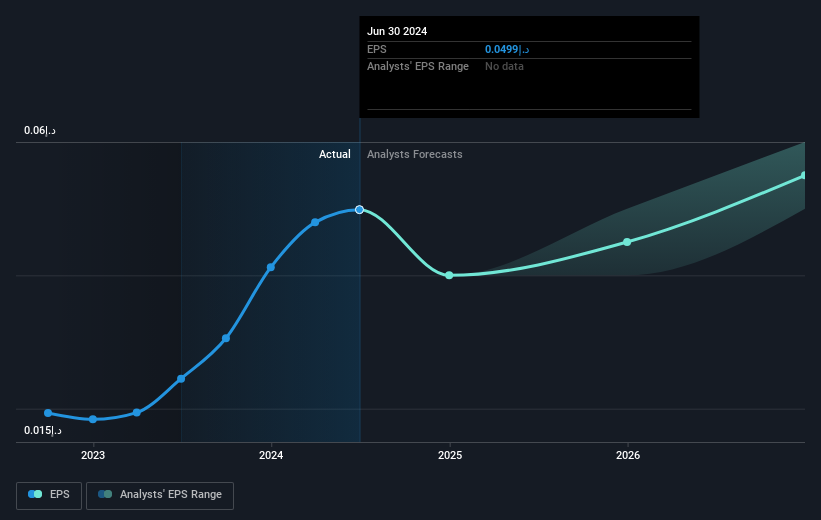- United Arab Emirates
- /
- Capital Markets
- /
- DFM:DFM
Dubai Financial Market P.J.S.C's (DFM:DFM) five-year earnings growth trails the 11% YoY shareholder returns

The main point of investing for the long term is to make money. But more than that, you probably want to see it rise more than the market average. But Dubai Financial Market P.J.S.C. (DFM:DFM) has fallen short of that second goal, with a share price rise of 53% over five years, which is below the market return. Unfortunately the share price is down 15% in the last year.
Since the stock has added د.إ480m to its market cap in the past week alone, let's see if underlying performance has been driving long-term returns.
View our latest analysis for Dubai Financial Market P.J.S.C
While markets are a powerful pricing mechanism, share prices reflect investor sentiment, not just underlying business performance. By comparing earnings per share (EPS) and share price changes over time, we can get a feel for how investor attitudes to a company have morphed over time.
During five years of share price growth, Dubai Financial Market P.J.S.C achieved compound earnings per share (EPS) growth of 30% per year. This EPS growth is higher than the 9% average annual increase in the share price. So it seems the market isn't so enthusiastic about the stock these days.
The company's earnings per share (over time) is depicted in the image below (click to see the exact numbers).

We know that Dubai Financial Market P.J.S.C has improved its bottom line over the last three years, but what does the future have in store? It might be well worthwhile taking a look at our free report on how its financial position has changed over time.
What About Dividends?
It is important to consider the total shareholder return, as well as the share price return, for any given stock. The TSR is a return calculation that accounts for the value of cash dividends (assuming that any dividend received was reinvested) and the calculated value of any discounted capital raisings and spin-offs. So for companies that pay a generous dividend, the TSR is often a lot higher than the share price return. We note that for Dubai Financial Market P.J.S.C the TSR over the last 5 years was 69%, which is better than the share price return mentioned above. This is largely a result of its dividend payments!
A Different Perspective
We regret to report that Dubai Financial Market P.J.S.C shareholders are down 13% for the year (even including dividends). Unfortunately, that's worse than the broader market decline of 0.8%. Having said that, it's inevitable that some stocks will be oversold in a falling market. The key is to keep your eyes on the fundamental developments. Longer term investors wouldn't be so upset, since they would have made 11%, each year, over five years. If the fundamental data continues to indicate long term sustainable growth, the current sell-off could be an opportunity worth considering. Is Dubai Financial Market P.J.S.C cheap compared to other companies? These 3 valuation measures might help you decide.
If you would prefer to check out another company -- one with potentially superior financials -- then do not miss this free list of companies that have proven they can grow earnings.
Please note, the market returns quoted in this article reflect the market weighted average returns of stocks that currently trade on Emirian exchanges.
New: Manage All Your Stock Portfolios in One Place
We've created the ultimate portfolio companion for stock investors, and it's free.
• Connect an unlimited number of Portfolios and see your total in one currency
• Be alerted to new Warning Signs or Risks via email or mobile
• Track the Fair Value of your stocks
Have feedback on this article? Concerned about the content? Get in touch with us directly. Alternatively, email editorial-team (at) simplywallst.com.
This article by Simply Wall St is general in nature. We provide commentary based on historical data and analyst forecasts only using an unbiased methodology and our articles are not intended to be financial advice. It does not constitute a recommendation to buy or sell any stock, and does not take account of your objectives, or your financial situation. We aim to bring you long-term focused analysis driven by fundamental data. Note that our analysis may not factor in the latest price-sensitive company announcements or qualitative material. Simply Wall St has no position in any stocks mentioned.
About DFM:DFM
Dubai Financial Market P.J.S.C
Operates the Dubai stock exchange and related clearing house in Dubai.
Solid track record with excellent balance sheet.


